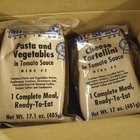tashka2000/iStock/GettyImages
Smooth, thick and creamy with a hint of a bite, sour cream is a kitchen staple used in salad dressings, dips, casseroles, soups, sauces and baked goods. Although sour cream retains its quality longer when unopened, the product won't last indefinitely and will eventually spoil.
Sour Cream Basics
Sour cream is made from pasteurized milk or cream -- not cream that has soured. The tangy, sour flavor comes from the addition of lactic acid culture, which causes the cream to coagulate. The cream is then heated until the desired thickness is reached. Sour cream may contain additives such as nonfat dry milk, sodium citrate, modified food starch and rennet. The fat content of sour cream depends on the fat content of the cream or milk.
Storing Sour Cream
An unopened container of sour cream retains freshness and quality for two to three weeks at temperatures between 38 and 40 degrees Fahrenheit. If you're unsure about the temperature of your refrigerator, use an appliance thermometer to check the temperature in several spots. Sour cream retains its quality for up to two weeks after the container is opened.
When to Discard
To prolong the life of sour cream, spoon out the quantity you need to use and return the remainder to the refrigerator immediately. Use a clean spoon to prevent transmitting of bacteria. Discard sour cream if spots of mold appear, even if the date on the container indicates the product is still good. If you forget to refrigerate sour cream, throw it out if it has been at room temperature for more than two hours because bacteria multiplies rapidly in temperatures between 40 and 145 F. It's normal for sour cream to separate and stirring returns the product to normal.
Buying Sour Cream
Regular sour cream contains at least 18 percent milk fat. Reduced-fat sour cream, made from half cream and half milk, contains approximately 40 percent less fat than regular sour cream. Low-fat sour cream contains 0.5 percent milk fat or less and is thickened by stabilizers. Sour cream made with cream and live milk cultures has the best flavor. If possible, avoid products that contains gelatin, vegetable enzymes, stabilizers and other additives. Look at the sell-by date on the container and buy the freshest sour cream available because it will taste better and last longer.
Related Articles

Why Does Greek Yogurt Have More Protein ...

Calories in a Tablespoon of Cream Cheese

How to Make Whipped Frosting Without ...

What Happens if I Forget to Refrigerate ...

The Difference Between Half-and-Half ...

Why Can't You Use Ultra Pasteurized ...

Why Does Cream Turn Into Butter?

How to Mix Whipped Cream Cheese & ...
Can Heavy Cream Be Frozen for Later Use?

How Many Calories Are in Cream of Wheat?

What Are the Ingredients in Elizabeth ...

How to Make Sour Cream Out of Heavy ...

How to Use Buttermilk That Has Passed ...

How to Read the Date Code on the ...

Can I Use Milk Instead of Heavy Cream ...

What Is "Cultured Cream"?

How to Prevent the Discoloration of ...

How to Make Homemade Stretch Mark ...
How Long Before a Hard Boiled Egg Goes ...

Does Cream Curdle When It Goes Bad?
References
Writer Bio
M.H. Dyer began her writing career as a staff writer at a community newspaper and is now a full-time commercial writer. She writes about a variety of topics, with a focus on sustainable, pesticide- and herbicide-free gardening. She is an Oregon State University Master Gardener and Master Naturalist and holds a Master of Fine Arts in creative nonfiction writing.